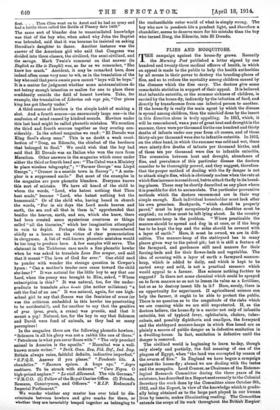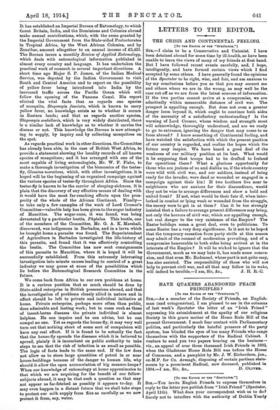FLIES AND MOSQUITOES.
Tcampaign against the house-fly grows. Recently RE Morning Post published a letter signed by one hundred and twenty-three medical officers of health, in which an appeal is made to the public to help the health authorities by all means in their power to destroy the breeding-places of flies, and so to reduce the mortality among children caused by the diseases which the flies carry. The doctors give some remarkable statistics in support of their appeal. It is believed that infantile enteritis, or the summer sickness of children, is carried by the house-fly, indirectly by the infection of food, and directly by transference from one infected person to another. If the house-fly is really the main agent by which the disease is spread among children, then the mischief done by the insect in this direction alone is truly appalling. In 1911, which, it will be remembered, was a year of great heat and drought in the summer, there were per thousand births one hundred and thirty deaths of infants under one year from all causes, and of these thirty-six per thousand were due to infantile enteritis. In 1912, on the other hand, in which the summer was cold and wet, there were ninety-five deaths of infants per thousand births, and of these ten per thousand were due to infantile enteritis. The connexion between beat and drought, abundance of flies, and prevalence of this particular disease the doctors consider to be thoroughly proved, and they suggest, therefore that the proper method of dealing with the fly danger is not to attack single flies, which is obviously useless when the rate at which flies increase is considered, but to attack the fly in its breed. ing-places. These may be shortly described as any place where Rio possible for dirt to accumulate. The particular preventive methods which the doctors recommend are in their way simple enough. Each individual householder most look after his own premises. Backyards, "which should be properly paved," must be kept scrupulously clean ; dustbins must be emptied; no refuse must be left lying about. In the country the manure-heap is the problem. " Where practicable the manure should be spread and dug in at once, or if the heap has to be kept the top and the sides should be covered with a layer of earth." Here, it must be owned, we are in diffi- culties. The manure-heap of the stableyard has in many places given way to the petrol pit; but it is still a feature of the farmyard, and gardeners still need manure for their forcing-beds and for their flower-beds and vegetables. The idea of covering with a layer of earth a farmyard manure- heap, which is added to daily, and which is kept to be carted away and sold, is not a practical measure which would appeal to a farmer. Has science nothing further to suggest P Is there not some chemical which could be sprayed on to farm manure so as not to lessen its value as a fertilizer, but so as to destroy insect life in it P Here, surely, there is an opportunity for experiment. If agricultural science can help the farmer, it ought to be able to protect the public. There is no question as to the magnitude of the risks which we are running while we are still unprotected. If, as the doctors believe, the house-fly is a carrier not only of infantile enteritis, but of typhoid fever, ophthalmia, cholera, tuber- culosis, and possibly diphtheria and smallpox, the farmyard and the stableyard manure-heaps in which flies breed are as plainly a source of public danger as is defective sanitation in a dwelling-house. In fact, sanitation is defective until the danger is removed.
The civilized world is beginning to learn to-day, though only slowly and partially, the full meaning of one of the plagues of Egypt, when "the land was corrupted by reason of the swarm of flies." In England we have begun a campaign against the horse-fly; abroad we are dealing with the tsetse and the mosquito. Lord Cromer, as Chairman of the Entomo- logical Research Committee during the three years of its existence, has described in a Report sent recently to the Colonial Secretary the work done by the Committee since October 8th, 1912, and the Report, in view of the knowledge which is gradu- ally being obtained ab to the large part played in our human lives by insects, makes illuminating reading. The Committee extends the scope of Re work throughout the British Empire'. It has established an Imperial Bureau of Entomology, to which Great Britain, India, and the Dominions and Colonies abroad make annual contributions, which, with the sums granted by the Imperial Government from the State-aided Protectorates in Tropical Africa, by the West African Colonies, and by Zanzibar, amount altogether to an annual income of £5,425. The Bureau issues a monthly Review of Applied Entomology, which deals with entomological information published in almost every country and language. It has undertaken the practical work of research in several important directions. A short time ago Major S. P. James, of the Indian Medical Service, was deputed by the Indian Government to visit South and Central America and to report on the possibility of yellow fever being introduced into India by the increased traffic across the Pacific Ocean which will follow the opening of the Panama Canal. His report elicited the vital facts that as regards one species of mosquito, Stegomyia fasciata, which is known to carry yellow fever, no knowledge exists as to whether it occurs in Eastern lands; and that as regards another species, Stegomyia scutellaris, which is very widely distributed, there is a similar lack of knowledge as to whether it carries the disease or not. This knowledge the Bureau is now attempt- ing to supply, by inquiry and by collecting mosquitoes on the spot.
As regards practical work in other directions, the Committee has already been able, in the case of British West Africa, to provide a statement showing the locality records of all known species of mosquitoes; and it has arranged with one of the moat capable of living entomologists, Mr. W. F. Fiske, to make a thorough investigation of the bionomics of the tsetse- fly, Glossina morsitans, which, with other investigations, it is hoped will be the beginning of an organized campaign against the various species of tsetse-fly throughout Africa. Since the tsetse-fly is known to be the carrier of sleeping-siekness, it is plain that the discovery of any effective means of dealing with it would have the most far-reaching effects upon the pros- perity of the whole of the African Continent. Finally— to take only a few examples of the work of Lord Cromer's Committee—valuable help has been given to the sugar industry of Mauritius. The sugar-cane, it was found, was being devastated by a particular beetle, Phytalus. This beetle, one of the members of the Committee, Mr. G. A. K. Marshall, discovered, was indigenous in Barbados, and in a larva which he brought home a parasite was found. The Superintendent of Agriculture in Barbados investigated the life-history of this parasite, and found that it was effectively controlling the beetle. The Committee has now sent consignments of this parasite to Mauritius, where it is hoped it will be successfully established. From this extremely interesting investigation into minute causes leading to control of a great industry we may guess at some of the possibilities which lie before the Entomological Research Committee in the future.
We come back from Africa to our own problems at home. It is a curious position that so much should be done by State-aided enterprise in British possessions abroad, and that the investigation of problems closely allied in nature and in effect should be left to private and individual initiative at home. Private enterprise, perhaps more often than public, does admirable and lasting work; but in cases such as these of insect-borne diseases the private individual is almost helpless. He can inquire and he can advise, but he can compel no one. Yet as regards the house-fly, it may very well turn out that nothing short of some sort of compulsion will have any real effect. If it is found to be actually the fact that the house-fly spreads the diseases which it is believed to spread, plainly it is incumbent on public authority to take steps to see that the risk of infection is as small as possible. The logic of facts leads to the same end. If the law does not allow us to store large quantities of petrol in or near house-buildings because of the danger to human life, why should it allow the open accumulation of big manure-heaps P When our knowledge of entomology at home approximates to that which we are acquiring for the benefit of our fellow- subjects abroad, it may be that such a question as that may not appear as far-fetched as possibly it appears to-day. It may even happen in a distant future that we shall take steps to protect our milk supply from flies as carefully, as we now protect it from, say, water.











































 Previous page
Previous page